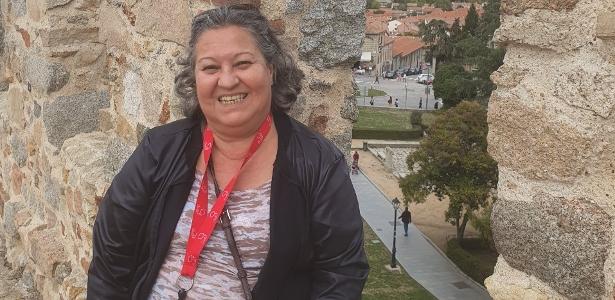Anger, pain and distrust. These are some of the possible feelings a person may have after receiving a diagnosis diabetic🇧🇷 But that’s understandable. The disease is chronic and associated with frightening outcomes such as blindness, amputation and dialysis.
However, science guarantees: communication, education, access to information and Health literacy (also called literacy) It can reduce malaise and improve therapeutic results.
From doctor to doctor
Medical literature indicates that less than 7% of patients can rely on this type of information in the first year after diagnosis. That was the case Walkeria Pinheiro López Avila, 64, from Sao Paulo. Now retired, she found out she had type 2 diabetes at work while undergoing preventive checkups.
In addition to a grueling routine, she was a sedentary smoker, above her healthy weight, and still had a family history of the disease. Walkeria Remember, since her first appointment, she remembers “terrorism”. “I was just rebuked: I had to lose weight, do sports, without really knowing what the disease was or what could happen,” he says.
Until treatment, blood glucose Walkeria It has not been downloaded. Then I changed doctors until I found a general practitioner. Not only did he explain exactly what his framework was, but he provided printed information on how to proceed. The professional also helped her to search for information in websites can be relied upon to better understand the disease. The cure is finally starting to show.
collective conscience
Without having heard of type 1 diabetes, which can appear from childhood and is autoimmune, baker Barbara Rufino Xavier, from Guarulhos, only discovered its existence when her son Rafael, 6 years old, received the diagnosis in hospital after making up for it.
In this case, access to information was immediate: the parents were greeted and directed by the endocrinologist on duty.
On their first subsequent medical visit, the family left the office with their hands full of papers. It was the content that helped and continues to help in understanding diabetes in all its aspects and stages, directing access to medicines through the SUS and also enabling a shared journey with other people in the same situation, by knowing ADJ – Juvenile Diabetes Association – and its various educational programmes.
The only thing missing is kindness and support at school,” says Barbara.
to Marco AckermannProfessor at the School of Public Health of the University of São Paulo (University of São Paulo), in such cases, parents should encourage health promotion actions in schools to improve collective awareness and health education for teachers, children and parents.
“It is possible that the initiative came to nothing. But this could have been a meeting where the group could exchange recipes for the desserts that Raphael eats at his colleagues’ parties. This action would involve the whole group in a process of learning and inclusion.”
Positive communication
Knowing how a patient is feeling in these times and establishing positive communication with them makes a huge difference, says Marcio Krakauer, Director of SBEM-SP (Brazilian Society of Endocrinology and Metabolism) and the Brazilian Society of Diabetes SBD.
The presence of this sensitivity can determine how treatment will be delivered, even among individuals who are, at first, suspicious, such as one of his patients who once stated: “In the beginning, diabetes was a bogeyman; now, it’s a pet.”
Although the disease affects, in Brazil, the equivalent of just over the entire population of the municipality of São Paulo (16 million people), “there was not – and has not been – a death certificate, nothing to lose,” says Krakauer.
“On the contrary, what the patient needs to know is that diabetes is the beginning of a new, healthier life. Well knowing, it can’t get worse, it can only get better,” the doctor continues.
More knowledge, more benefits
Diabetes mellitus is a group of diseases (such as type 1 or 2 diabetes, gestational diabetes) associated with glucose metabolism that leads to a buildup of sugar in the blood.
Treatment is based on four pillars: the use of medications, changes in diet, and physical activity, as well as self-care education. Explanations from Levimar Rocha Araújo, patient with type 1 diabetes and national chair of SBD.
“To control the disease, we make full use of the most powerful interventions: access to information and understanding the importance of lifestyle changes, which we do by building knowledge about what the disease is and how it behaves,” Araujo says.
This focus on education is justified by the fact that scientific evidence indicates that self-management of the disease reduces blood glucose levels – and thus prevents complications – as well as the risk of death from all causes. The data has been published in the journal Endocrine. The more knowledgeable the patient is, the better the clinical and psychosocial responses, as well as the quality of life.
The value of health literacy
Diabetes is a disease with complex concepts, and it still requires the patient to be skilled with minimal calculations. Because of this, Walkeria and Barbara used the internet to understand more about her. The first stated that it did not work, while the second managed to clear up the doubts about the contents that I found with the doctor.
The fact is that there is no shortage of data on the disease on the network, but depending on the degree of health education, that is, personal skills and competencies to search for, understand, evaluate and comprehend this information, they will not. Cater to those who need it most, given factors such as inappropriate language and format and hierarchy of topics on the site, which discourage further research.
To increase your chances of better understanding information about diabetes, look for reliable, expert sources (see examples below). If you don’t understand a topic, record your question. This will help the content team revise the information to make it clearer.
References: They are X, Li J, Wang B, Yao Q, Li L, Song R, Shi X, and Zhang JA. Diabetes self-management education reduces the risk of all-cause mortality in patients with type 2 diabetes: a systematic review and meta-analysis. Endocrine. 2017 Mar; 55 (3): 712-731. doi: 10.1007/s12020-016-1168-2. Epub 2016 Nov 12, PMID: 27837440; Center for Disease Control. Education and training in self-management of diabetes among privately insured persons newly diagnosed with diabetes–United States, 2011-2012. MMWR Vol. 63, no. 46. 2014.

“Wannabe internet buff. Future teen idol. Hardcore zombie guru. Gamer. Avid creator. Entrepreneur. Bacon ninja.”



